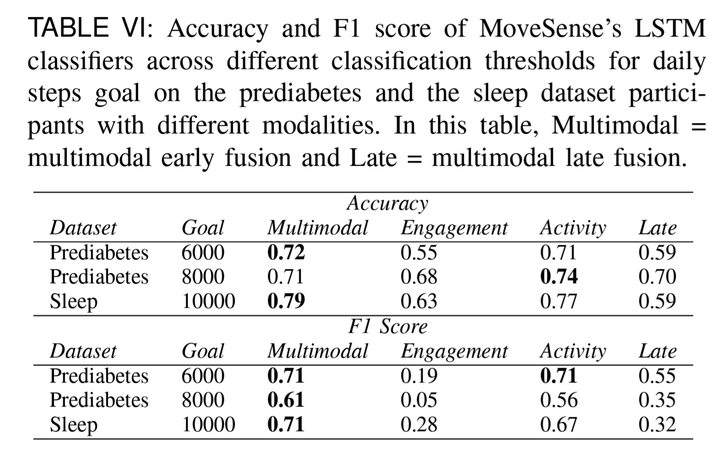Multimodal Physical Activity Forecasting in Free-Living Clinical Settings: Hunting Opportunities for Just-in-Time Interventions

Abstract
Objective: This research aims to develop a lifestyle intervention system, called MoveSense, that forecasts a patient’s activity behavior to allow for early and personalized interventions in real-world clinical environments. Methods: We conducted two clinical studies involving 58 prediabetic veterans and 60 patients with obstructive sleep apnea to gather multimodal behavioral data using wearable devices. We develop multimodal long short-term memory (LSTM) network models, which are capable of forecasting the number of step counts of a patient up to 24 hours in advance by examining data from activity and engagement modalities. Furthermore, we design goal-based forecasting models to predict whether a person’s next-day steps will be over a certain threshold. Results: Multimodal LSTM with early fusion achieves 33% and 37% lower mean absolute errors than linear regression and ARIMA respectively on the prediabetes dataset. LSTM also outperforms linear regression and ARIMA with a margin of 13% and 32% on the sleep dataset. Multimodal forecasting models also perform with 72% and 79% accuracy on the prediabetes dataset and sleep dataset respectively on goal-based forecasting. Conclusion: Our experiments conclude that multimodal LSTM models with early fusion are better than multimodal LSTM with late fusion and unimodal LSTM models and also than ARIMA and linear regression models. Significance: We address an important and challenging task of time-series forecasting in uncontrolled environments. Effective forecasting of a person’s physical activity can aid in designing adaptive behavioral interventions to keep the user engaged and adherent to a prescribed routine.